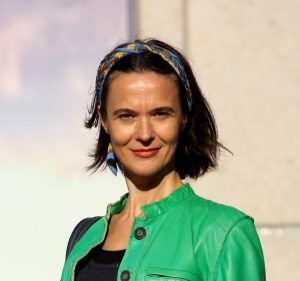
Research Interest
Biological dosimetry for radiations and chemicals
Targeted radiotherapy as a powerful method to bring radiation dose directly to the critical
cancer cells and thus improve treatment results of advanced stages of cancers, in particular
metastatic disease
Carcinogenesis
Non-targeted radiation effects
After finishing her Degree in Theoretical Physics at “Al.I.Cuza” University of Iasi, Romania Otilia obtained a fellowship for a postgraduate course in Medical Physics at University of Patras, Greece. This was followed by an MSc in Radiation Biology at University College London, UK and a PhD in Radiation Biology at Dublin Institute of Technology, Ireland, both funded by the EU. The PhD dissertation has been developed at three sites: DIT in Ireland, LUMC in the Netherlands and the Gray Cancer Institute in the UK. She then went to do a Post-doctoral in the Public Health England in Harwell, UK where she investigated the impact of long-term exposure to low concentrations of chemicals on the cellular response to ionising radiation through the use of in vitro cytogenetics. During this appointment she also participated in other substantial team projects:
- INSIGHT-aiming at identifying early cell and molecular processes modulating late normal tissue responses to radiotherapy for breast cancer (collaboration with Royal Marsden Hospital, UK and Mannheim Medical Center, Germany)
- Bio-dosimetry for synchrotron microbeam radiation therapy (collaboration with European Synchrotron Radiation facility, Grenoble, France)
Dr. Nuta has several years of experience in teaching MSc courses in the Radiation Biology programme and the Cancer programme at University College London. From there she moved to KFSH&RC in Riyadh, Saudi Arabia to do training in HDR Brachytherapy treatment planning for patients with gynecological cancers.
In 2014 Otilia joined Pavia University, Italy as postdoctoral fellow to work as part of the EUTEMPE-RX project (funded by Horizon 2020) on the development of the online Radiation Biology teaching module for European Board-based expert level accreditation in Medical Physics Experts in Radiology and Interventional Radiology.
In 2016 she joined NUSOM; during her appointment she developed educational teaching and learning materials for courses of MD, Master of Public Health, and Master in Molecular Medicine programmes and she co-Directed the Master in Molecular Medicine programme.
During all this time she guided numerous students or visiting scientists.
- Correlation between the radiation responses of fibroblasts cultured from individual patients
and the risk of late reaction after breast radiotherapy. [Cancer Letters; doi:
10.1016/j.canlet.2016.02.036] - Correlation between DNA damage responses of skin to a test dose of radiation and late
adverse effects of earlier breast radiotherapy. [Radiotherapy and Oncology; doi:
10.1016/j.radonc.2016.04.012] - Impact of long term exposure to sodium arsenite on cytogenetic radiation damage.
[Mutagenesis 2014; doi: 10.1093/mutage/get070] - The impact of the bystander effect on the low-dose hypersensitivity phenomenon.
[Radiation and Environmental Biophysics 2008, 47[2]:265-74] - Energy Deposition by Alpha Particles [2keV- 1 MeV] in cylindrical targets. [MRC Monograph
2002/1 | 220 Pages]
Critical Research Reasoning



